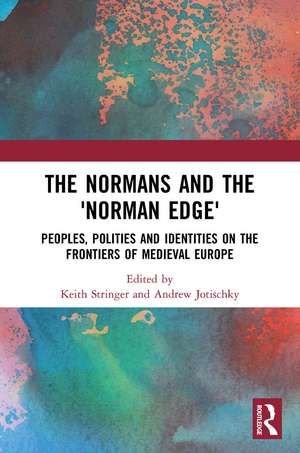The Normans and the 'Norman Edge': Peoples, Polities and Identities on the Frontiers of Medieval Europe
Editat de Keith Stringer, Andrew Jotischkyen Limba Engleză Paperback – 30 iun 2021
achievements as a series of separate and discrete histories. Such treatments are
valid and valuable, but historical understanding of the Normans also depends
as much on broader approaches akin to those adopted in this book. As the
successor volume to Norman Expansion: Connections, Continuities and Contrasts,
it complements and significantly extends its findings to provide a fuller appreciation
of the roles played by the Normans as one of the most dynamic and
transformative forces in the history of medieval ‘Outer Europe’. It includes
panoramic essays that dissect the conceptual and methodological issues concerned,
suggest strategies for avoiding associated pitfalls, and indicate how far
and in what ways the Normans and their legacies served to reshape sociopolitical
landscapes across a vast geography extending from the remoter corners
of the British Isles to the Mediterranean basin. Leading experts in their fields
also provide case-by-case analyses, set within and between different areas, of
themes such as lordship and domination, identities and identification, naming
patterns, marriage policies, saints’ cults, intercultural exchanges, and diaspora–
homeland connections.
The Normans and the ‘Norman Edge’ therefore presents a potent combination
of thought-provoking overviews and fresh insights derived from new
research, and its wide-ranging comparative focus has the advantage of illuminating
aspects of the Norman past that traditional regional or national histories
often do not reveal so clearly. It likewise makes a major contribution
to current Norman scholarship by reconsidering the links between Norman
expansion and ‘state-formation’; the extent to which Norman practices and
priorities were distinctive; the balance between continuity and innovation;
relations between the Normans and the indigenous peoples and cultures they
encountered; and, not least, forms of Norman identity and their resilience over
time. An extensive bibliography is also one of this book’s strengths.
Preț: 391.79 lei
Nou
Puncte Express: 588
Preț estimativ în valută:
74.98€ • 77.99$ • 61.90£
74.98€ • 77.99$ • 61.90£
Carte tipărită la comandă
Livrare economică 14-28 aprilie
Preluare comenzi: 021 569.72.76
Specificații
ISBN-13: 9781032084237
ISBN-10: 1032084235
Pagini: 360
Dimensiuni: 156 x 234 x 19 mm
Greutate: 0.51 kg
Ediția:1
Editura: Taylor & Francis
Colecția Routledge
Locul publicării:Oxford, United Kingdom
ISBN-10: 1032084235
Pagini: 360
Dimensiuni: 156 x 234 x 19 mm
Greutate: 0.51 kg
Ediția:1
Editura: Taylor & Francis
Colecția Routledge
Locul publicării:Oxford, United Kingdom
Cuprins
List of Figures
List of Contributors
Editorial Notes
List of Abbreviations
Prologue: The Norman Edge in Context
Keith Stringer
1. Norman Identity and the Identity of Normandy, c.900–c.1300
Daniel Power
2. The Normans in the North
Judith A. Green
3. Names on the Norman Edge: The Persistence of Gaelic Names in ‘Middle Britain’
Fiona Edmonds
4. The Shape of the Norman Principality of Gwynedd
C.P. Lewis
5. Exogamy and Miscegenation in the Norman Worlds
Elisabeth van Houts
6. South Italian Normans and the Crusader States in the Twelfth Century
Ewan Johnson and Andrew Jotischky
7. The Nobility of the Principality of Antioch, 1098–1187: Names, Origins and Identity
Alan V. Murray
8. Saints’ Cults and Devotions on the Norman Edge: The Case of St Katherine of Alexandria
Andrew Jotischky
9. The Norman Edge: Some Reflections on Norman Expansion into ‘Outer Europe’
Keith Stringer
Bibliography
Index
List of Contributors
Editorial Notes
List of Abbreviations
Prologue: The Norman Edge in Context
Keith Stringer
1. Norman Identity and the Identity of Normandy, c.900–c.1300
Daniel Power
2. The Normans in the North
Judith A. Green
3. Names on the Norman Edge: The Persistence of Gaelic Names in ‘Middle Britain’
Fiona Edmonds
4. The Shape of the Norman Principality of Gwynedd
C.P. Lewis
5. Exogamy and Miscegenation in the Norman Worlds
Elisabeth van Houts
6. South Italian Normans and the Crusader States in the Twelfth Century
Ewan Johnson and Andrew Jotischky
7. The Nobility of the Principality of Antioch, 1098–1187: Names, Origins and Identity
Alan V. Murray
8. Saints’ Cults and Devotions on the Norman Edge: The Case of St Katherine of Alexandria
Andrew Jotischky
9. The Norman Edge: Some Reflections on Norman Expansion into ‘Outer Europe’
Keith Stringer
Bibliography
Index
Notă biografică
Keith Stringer is Professor Emeritus of Medieval British History at Lancaster University.
Andrew Jotischky is Professor of Medieval History at Royal Holloway, University of London.
Andrew Jotischky is Professor of Medieval History at Royal Holloway, University of London.
Descriere
This book makes a major contribution to current Norman scholarship by reconsidering the links between Norman expansion and ‘state-formation’; the extent to which Norman practices and priorities were distinctive; the balance between continuity and innovation; and, not least, forms of Norman identity and their resilience over time.
